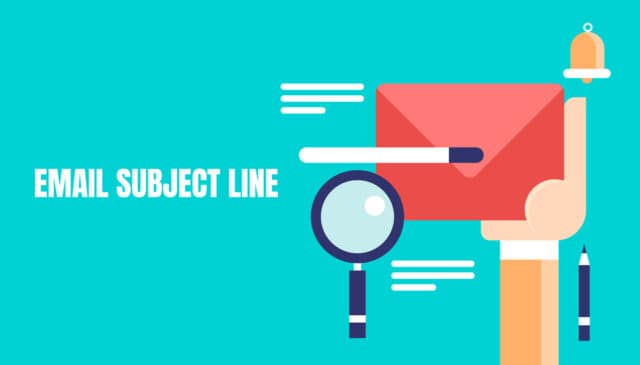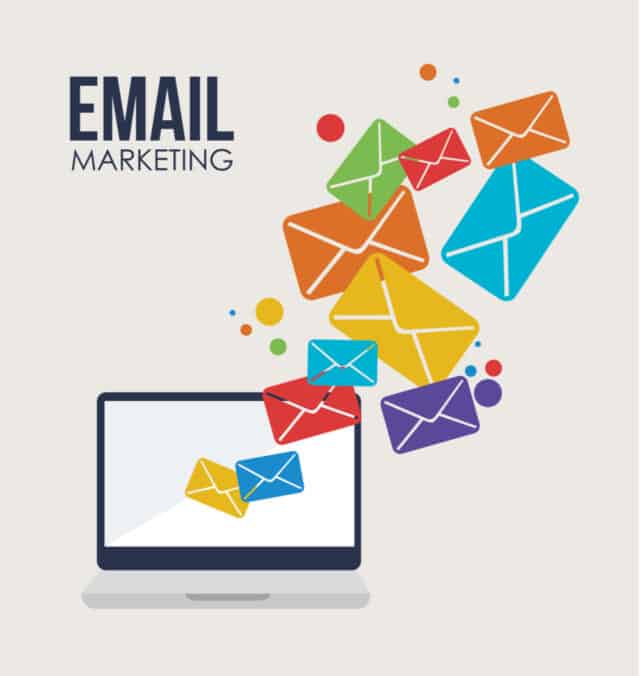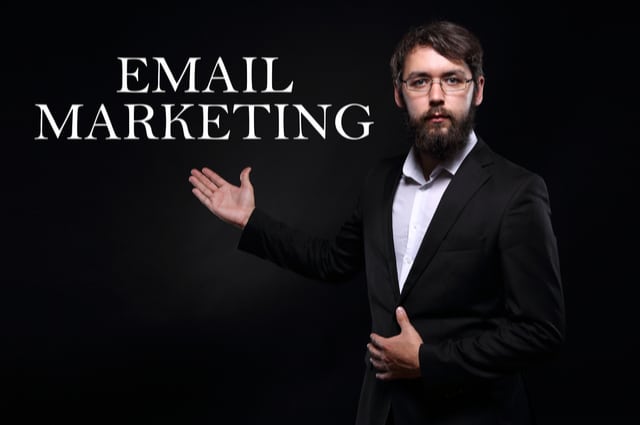Catchy subject lines — what are some great subject lines for email campaigns?
If you’re sending a sales email, catchy subject lines are essential. It’s the most crucial line in your email. It’s something that must be brought up in any active sales meeting. You can expect average results from your email marketing strategy if you don’t put in the effort to create something appealing.
Why? Your emails will be ignored since no one will open them.
What makes getting email subject lines right so crucial?

When cold calling, an email subject line is the essence of your introductory greeting. They have an impact on your email open rate. 47% of people will determine whether to open an email depending on the subject line alone.
Obviously, you can’t sell your prospects on what’s inside if they don’t open your emails. When your subject lines, on the other hand, strike a chord with readers, you’ll have the chance to bring readers a bit closer to becoming a customer.

The problem is that subject lines are incredibly tricky to nail. Every day, the average professional receives about 100 emails.
Everything, including team announcements to urgent customer requirements to newsletter revisions and login details resets, floods their inbox.
Because there’s so much to sort through, chances are your email won’t be opened unless it’s urgent. That’s why captivating your prospect’s interest with a subject line that piques their interest enough to make them want to read on might be difficult.
It’s no wonder that the typical email open rate across all sectors is only 21%. So, what must you put in a sales email’s subject line to make it jump out?
What makes a decent subject line for a sales email?

According to reports, famed copywriter Eugene Schwartz said, “Your headline has a task: to halt your prospect and persuade him to read the next phrase of your ad.”
Aside from the fact that prospects are no longer exclusive, this is very accurate—and it also applies to your subject line.
It just has one goal: to make your prospect pause and open your email. Your subject line should imply some value to the prospect in order to do this.
This could be guidance on how to boost revenue in the coming quarter, or it could just be an opportunity to learn why their friend Benjamin recommended them to you.
In any event, what matters is what the prospect cares about.
The most effective subject lines pique your prospects’ attention without divulging too much information, encouraging them to open the email and read on.
Good topic lines are also simple to comprehend. Those that aren’t will be overlooked or removed!
As a result, make sure your subject lines are written in clear, plain English and aren’t too long to be chopped off.
If you want your entire team to be able to generate outstanding email subject lines, make it simple for them to share their prospect knowledge.
A sales software or communication tool would be useful in this situation.
Allow your salespeople to ask each other, “How do you feel about this subject line?” and obtain immediate feedback from their team while creating sales emails:
Let’s look at some subject line samples that you may copy and adapt for your next campaign with that in mind.
Subject lines for sales emails

The finest salespeople will tell you how crucial an email subject line is. They won’t reveal to you how they do it, though. We’re here to help and debunk this crucial part of the sales process.
Here are some examples of email subject lines to get you started:
Sales subject lines that pique your interest
We don’t like it when our knowledge of something is incomplete.
Subject lines that grab our interest fill in the blanks by providing surprising, incomplete information and promising closure if we continue reading.
If you use this strategy, make sure you keep the promise you made in the body of the email. It should actually fill in the blanks in your topic line.
“Do not open this email.”

This subject line employs definite reverse psychology to entice the reader to open the envelope.
“They said it couldn’t be done.”
Who exactly are “they”? Who are “we”? What exactly is “it”? This topic line piques the interest of the reader in a quest for solutions.
“You are cordially invited.”

This subject line plays with the joy of receiving an invitation. What is this invitation to? Who knows what will happen?
“Hey, can you keep a secret?”
This sentence also makes the reader feel as if they are privy to something exceptional. It’s worth setting up the email to figure out what it is.
“This isn’t cool, guys,”
This subject line from BuzzFeed’s headline writers makes us wonder what juicy drama will be revealed in the email body.
“Are you a member of the 3%?”
What is 3 percent of? This sentence draws us in by implying that we may be part of a small (or not so small) minority.
Subject lines for direct sales
The direct approach is sometimes the best strategy. Subject lines that are direct and explain why you’re writing to make your prospect’s life easier.
Instead of risking opening a false email, prospects will know exactly what to expect from the communication and can determine whether it is of interest to them.
“Regarding [a problem] at [prospect’s firm]…”
This straightforward subject line makes it clear what the communication is about. “About Johnny’s workshop’s lumber supply…”, for example.
Ask a quick question about [prospect’s firm]”
This subject line is clear and concise about what’s within. Your prospect can decide whether they wish to answer any questions before opening the email.
“Your monthly goal,”
Without having to open the message, the reader is explicitly notified of what the message’s focus will be. “Your monthly Google Ads impressions objective,” for example.
Subject lines for sales that are personalized

Personalized subject lines give your emails a more personal touch and appear more thoughtful than generic communications addressed to everyone.
Addressing the receiver by name, saying where they’re from, or mentioning something distinctive about their career or interests are all examples of personalization.
For good reason, personalized emails are widely used and preferred nowadays. Even yet, they have a 0.5 percent higher open rate than non-personalized options. There’s nothing to sneeze on here!
“Hey, [name], I really like your [website name] blog post.”
This phrase mixes personalization with commendation, informing the reader that you took the time and effort to investigate them as a genuine person.
“Hi, [name], I saw you’re putting in a lot of effort toward [target].”
This statement implies that you are eager to assist the reader in achieving a certain goal that they find significant.
“Hello, [name], [question]?”
This straightforward, yet respectful, subject line goes to the point.
“Congratulations on [important event]”
Expressing your appreciation or best wishes on a special occasion might go a long way toward generating goodwill in your prospect.
“Hey, [name], we heard you’re an expert in [field of knowledge].”
People prefer to be recognized for their abilities, and this gives the reader a welcome ego boost.
“I always want the greatest for you, [name],”
This statement demonstrates that you regard and admire your prospect, providing a sense of closeness and care.
Subject lines for pain-point sales

By focusing on your prospects’ problems, you may make your subject lines more relevant. After all, it’s impossible to ignore a message that focuses on a specific problem you’re having.
The prospect of discovering a new answer makes it worthwhile to investigate what’s within.
“[X] solutions to your [pain spot]”
This subject line promises rapid, practical counsel to assist the reader with his or her individual situation.
Even if the email doesn’t include a sales pitch, immediately delivering value to your prospect can go a long way toward warming them up.
“Are you having trouble with [pain point]?” “You’re not by yourself.”
Reassure your prospect by telling them that other people are experiencing similar issues and that you may be able to assist them.
“Hi, [name]. Here’s our take on [pain spot].”
This statement promises the reader a new way to approach their challenge.
“Fix your [pain spot] in [X] weeks,” says the doctor.
The set timetable indicates that a practical solution to the reader’s problem may be discovered inside.
Subject lines with urgency and scarcity
Using urgency and scarcity in your subject lines is one approach to make them stand out. People are inspired to act since they do not want to feel as though they have been left behind (i.e., FOMO).
This makes it more difficult for your prospects to put off reading your emails or to trash them without first viewing them.
“Tonight,”
This single-word subject line evokes a feeling of suspense and priority in the reader, bringing them in.
“Only one day left to take advantage of [deal]”
This creates the idea that the time is ticking and that readers must move swiftly to participate in the event.
“[X] hours till our [offer] expires,”
To increase the sense of urgency, this subject line sets an even shorter deadline.
“Only [X] days remain to complete [goal/task].”
This statement resets your prospect’s mind, re-focusing them on their goal.
Subject lines with numbers

If your product or service produces a definite, measurable effect, you should include it in your subject line. A specific assertion is more convincing than a general one—just make sure it’s not too good to be true.
Remember that numbers presented in digits rather than words are more effective at capturing reader attention and will save your character space.
“May I deliver you [X] percent more [result]?”
This eye-catching subject line provides the reader with a well-defined advantage at a well-defined price.
“$ [X] over the next [X] months?”
This sentence entices your prospects to continue reading by describing the precise financial gain they may obtain in the stated time frame.
Subject lines for referral sales
Mentioning that you were suggested to your prospects by someone they know and respect is a very effective technique to entice them to open your email. Referrals from individuals they know are trusted by 92 percent of people.
Subject lines that include the referral person’s name establish a bond for both you and the prospect and increase their degree of interest.
Use this strategy only if the reference is authentic!
“[Referring Individual’s name]”
When your prospects see a name, they recognize in a subject line, they’ll be curious as to why.
“[Referral name] assisted me in finding you.”
Although it isn’t precisely an endorsement, this sentence shows your prospect that you went to great pains to locate them.
Subject lines for follow-up sales

Follow-up emails are critical in keeping the sales dialogue rolling.
A clever sales follow-up email keeps you fresh and relevant and helps you to set out certain next steps, even if you’ve just hung up with your prospect or acquired some additional data they’ve requested.
“Our future moves,”
This straightforward subject line demonstrates that you’ve put up a strategy that your prospect only needs to review and approve.
“Hello, [name]. I’d appreciate your thoughts on our prior encounter.”
Inviting feedback from prospects allows you to tie up any loose ends and get a feel for how things went.
Subject lines for sales with no response
Your opportunities may vanish off the earth’s surface with no trace at times. When this happens, it’s critical to decide whether to keep the relationship going or to call it quits.
“[Name]?”
Direct, yet with a touch of worry and mystery. What could the email possibly say? This subject line might be used in a last-ditch email.
“Am I correct in assuming…?”
This question elicits a clear answer, offering your prospect the option of continuing or cutting connections.
“If you decide not to cooperate with [your organization],”
Here, you inform the prospect that you believe they are no longer interested in you, but that they can change their mind at any time.
Subject lines for meeting requests in sales

Help makes it easier than probable for prospects to say yes when mailing out meeting requests.
This may include presenting the meeting as a casual conversation or restricting the suggested time to a short period.
“Hi, [name]. This week, 10 minutes?”
This portrays the appointment as a low-key, casual get-together. It’s simple to say no to an hour-long conversation; 10 minutes seems much more manageable.
“How about a short check-in?”
This subject line highlights the informal nature of the intended meeting and allows your prospect to determine how long it should last.
“Invitation to [day’s] meeting,”
This sentence gives the date of the meeting but encourages the reader to read the email for further information.
Improve the catchy subject lines of your sales emails.
Take email subject lines seriously. A catchy subject line grabs your prospect’s attention and puts you in a good position to create a relationship—and close the transaction.
Meanwhile, the sound of crickets can be heard if the subject line is irrelevant or dull. Use the subject line suggestions in this blog to improve your email marketing and see your open rates skyrocket.
Subscribe to our Newsletter
Sign up to receive email updates on new product announcements, exclusive sales and marketing content, special offers on email validation plans, and more.
We send curated content as per your preference and do not indulge in spam!
What would you like to know about
We’re committed to your privacy. TuxMailer uses the information you provide to us to contact you about our relevant content, products, and services. You may unsubscribe from these communications at any time. For more information, check out our privacy policy.



